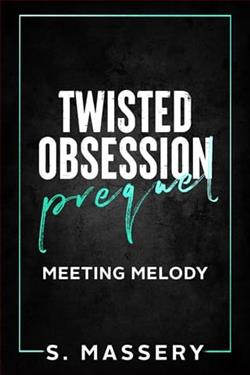Page 39 of The Heart We Guard
With those thoughts on my mind, I stride back up the basement staircase with purpose.
Until I step into the kitchen and see the rose in a mug next to the coffee machine.
And my heart thuds in my chest. There’s no note. No number to call.
“Asshole,” I mutter, even as I touch the petals. “You should have just left.”
Having nothing might have been easier than this crumb.
I try not to look at it as I make my coffee, but it might has well have a glowing neon sign over it saying,Look What Butcher Did.
A part of me wants to throw it out, but there’s a sliver of whimsy and nostalgia in my soul that I didn’t know about, and it comes out fighting. Ideas of pressing the flower to keep it, like some wilting, over-wrought heroine, come to mind.
“Urgh.” I grimace, snatching my cup and taking it to the yard.
I’m not much of a gardener and have a man who comes once every two weeks to give it a cursory weed and to trim back the utilitarian shrubs, but it still feels like my sanctuary. At the bottom, Esme and I removed a fence panel between our homes and built a compost heap. She was worried her dog would pay my yard too many visits, but Winston has the mental fortitude of a feather. If he were human, he’d be an extra inLa Cage aux Follesand lie on a chaise between breaks, complaining about his migraines. The very notion of putting a pristine white paw into compost is beyond him.
And so, as much as I love him, he never comes to visit.
Esme is down there, throwing some food waste onto the pile. She’s clad in a floor-length dressing gown that has more Norma Desmond about it than compost builder.
“Morning,” I say as I greet her.
“Morning, Greer. How are you?”
I shrug. “Meh.” It’s the truth.
Esme nods like she knows all the answers to everything. “Is it something to do with the man who finally left your house this morning?”
“You saw him? What time did he leave?”
She looks up at the sky with pursed lips. I’m guessing she’s working her way back through her day. “Around five. The problem with getting older is that while you might have more time to sleep, your body no longer lets you.”
Esme is seventy-five and adopted me seven seconds after I moved next door four years ago. A few months back, we had an afternoon tea, just the two of us, to celebrate her turning three-quarters of a century. She never married but had lots of lovers. And she has no children but often tells me she thinks of me as her own. Once, after one Christmas martini too many, she told me I was the best kind of child. One who entered her life fully formed, already financially stable, and not requiring any true parental direction.
“There’s medical assistance you can get for that,” I say.
She shrugs. “Why bother when there are my white spirits?”
Gin, vodka, and white vermouth. I smile at that.
“You liked that man. I can tell,” she says.
“I’m not sure what I felt about him, to be honest.”
Esme sighs and looks off into the distance. “Eric Haramond. He was the one who got away. He was a B-list movie star. Never the main part, always the quirky sidekick. I met him in a bar inLos Angeles when I was twenty-seven and my breasts were at their prime.”
I can’t help but laugh at that. “What happened to Eric?”
Her gaze returns to mine, whip fast. “A lack of follow through. I was there with a friend for three months while we tried to become models. We lived in a run-down place and survived on a diet of Pall Mall cigarettes and maraschino cherries from our drinks.”
I love the way Esme tells stories. There’s such an off-hand casualness to them, even though they sparkle thanks to her words. “I didn’t know you were a model, although I can see it.”
Esme laughs and puts her hand to her chest. “Oh, lord. No. I never made it. My catwalk style was referred to as that of a newborn giraffe. And I only profiled well from the left.” She turns her face from left to right so I can see the alleged difference.
“Esme, you’re beautiful from any angle.”
And far more fabulous.















